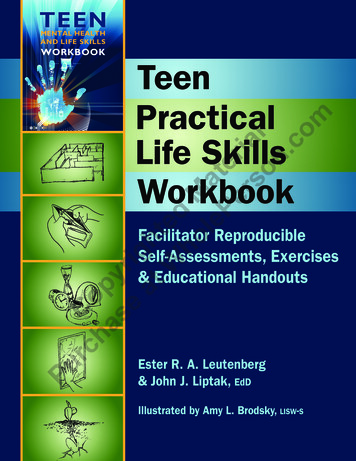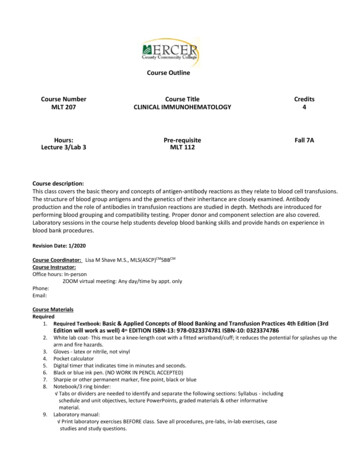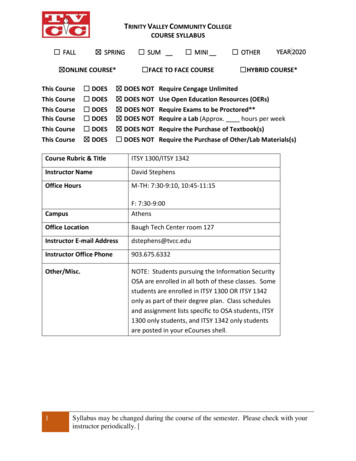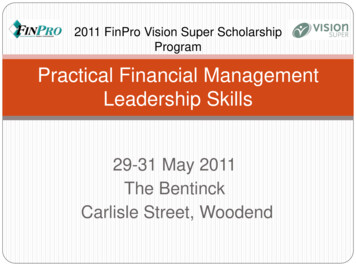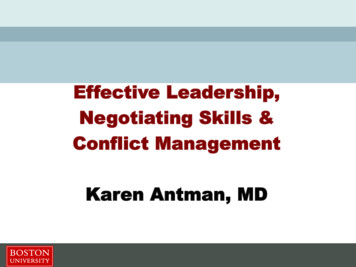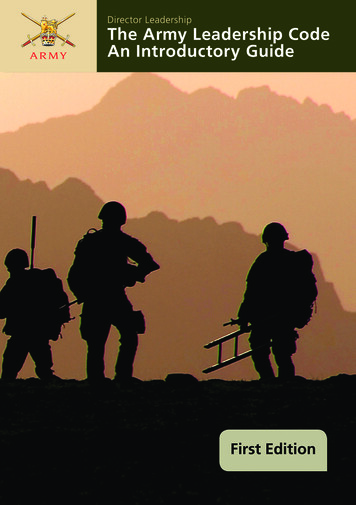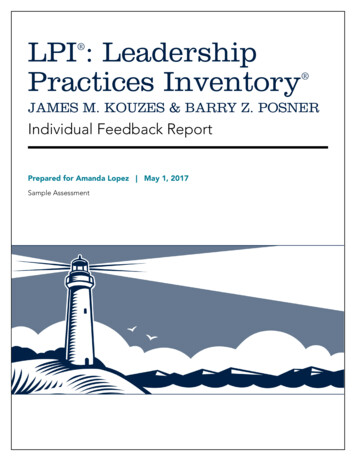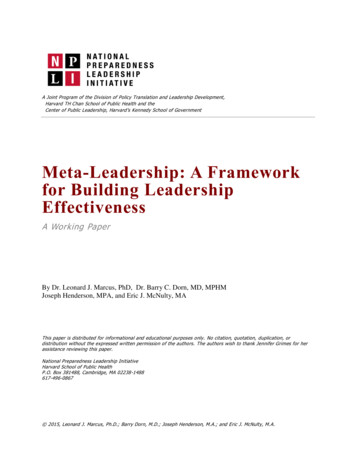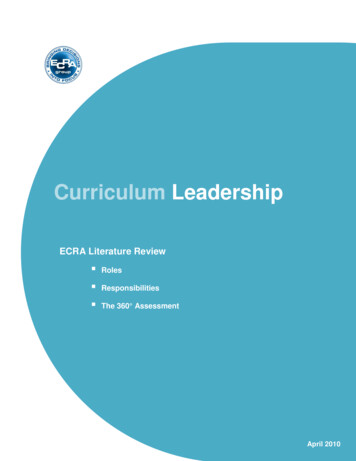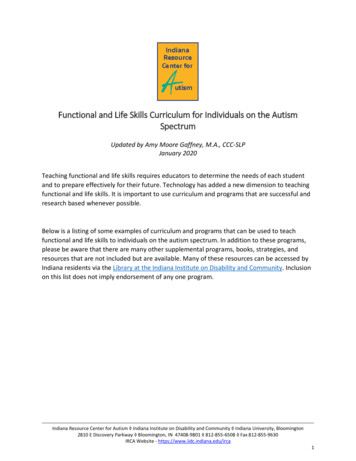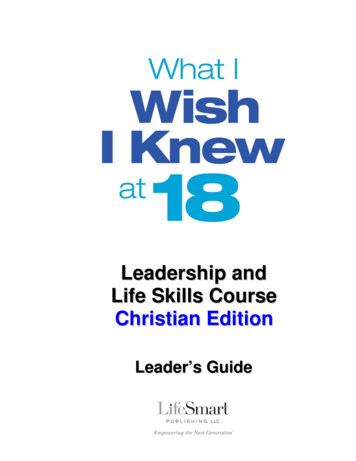
Transcription
Leadership andLife Skills CourseChristian EditionLeader’s Guide
Leader’s GuideWhat I Wish I Knew at 18: Life Lessons for the Road Ahead – Leaders Guide, Christian EditionFirst Edition Christian Leaders Guide, 2011Copyright 2011 by Dennis Trittin and Arlyn LawrenceAll rights reserved. Permission is granted for printing and copying by instructors in conjunction withthe use of the What I Wish I Knew at 18 Student Guide-Christian Edition. Other than for thispurpose, no part of this publication may be reproduced, stored in a retrieval system, or transmittedin any form by any means—electronic, mechanical, photocopy, recording, or otherwise—except forbrief quotations in critical reviews or articles, without the prior permission of the publisher, exceptas provided by U.S. copyright law.Published by LifeSmart Publishing, LLC. Gig Harbor, WA 98332.The What I Wish at 18 book and student guide can be purchased through LifeSmart Publishing.To ww.atlasbooks.comWhat I Wish I Knew at 18 Leadership and Life Skills Course 2011 by LifeSmart Publishing, LLC.All Rights Reserved.2
Leader’s GuideSpecial Message from the AuthorsWelcome! We’re glad you’ve chosen the What I Wish I Knew at 18 Leadership and Life Skills courseas you invest in the lives of young people. We honor and applaud you!We recognize that many communities influence the life of a child—family, school, faith, employers,and service organizations, to name a few. But while each has its own sphere of impact, their effortsare not always coordinated.As a result of this (and various socioeconomic and cultural factors), we are observing a growing lifeskills deficit and a lack of direction among today’s young people. This is taking its toll on both anindividual and societal basis. It comes at a time when our world economy has become increasinglycompetitive and institutions are de-emphasizing the teaching of absolute values. The stakes arehigher, and fixing this problem has become a societal imperative.These challenges inspired us to offer a solution—a comprehensive and innovative Christianleadership and life skills course based on the success principles covered in the book, What I Wish IKnew at 18: Life Lessons for the Road Ahead. It describes the qualities and methods of honorableleaders while instilling practical, before-the-fact wisdom in key life decision arenas. Through itsemphasis on (and opportunities for) personal reflection, peer interaction, and practical application,this course inspires, equips, and empowers students to reach their full potential and positivelyimpact the world.That’s where YOU – the Christian teacher, faith leader, parent, or mentor—come in. You provide aMUCH NEEDED source of encouragement and inspiration for the young adults in your life to seekGod’s perspective, wisdom, and direction for their lives. Gary Kinnaman of the Barna ResearchGroup says,Many young people do not seem to understand how a rich,historic understanding of the Christian faith and the gospel oughtto inform their career aspirations. And faith leaders are not asintentional as they could be with instruction and coaching onthese types of decisions. Understanding how teenagers hope tospend their professional lives can help faith communities andinstitutions better support these students as they discern God’scalling in their lives.What I Wish I Knew at 18 Leadership and Life Skills Course 2011 by LifeSmart Publishing, LLC.All Rights Reserved.3
Leader’s GuideThe Christian Edition of the What I Wish I Knew at 18 course was written particularly for thosestudents who are embarking on their life journey with a Christian perspective. We believe knowingthat God has a plan and purpose for one’s life is a primary foundation for building a life of impact.His Word provides invaluable and trustworthy principles for developing a student’s worldview andlife perspective—the foundation from which everything else in their life will grow.May this course help you achieve your mission of preparing young people for a fulfilling, Godhonoring life journey with lasting impact!Sincerely,Dennis TrittinArlyn LawrenceWhat I Wish I Knew at 18 Leadership and Life Skills Course 2011 by LifeSmart Publishing, LLC.All Rights Reserved.4
Leader’s GuideGuide for Leaders of the What I Wish I Knew at 18Leadership and Life Skills Course - Christian Editionleadership * empowerment * impact * confidence * integrity * wisdom * success * purposeWhat’s So Important about Leadership and Life Skills Development?" preparing young people for success in life is not justa moral obligation of society but also an economic imperative."Arne Duncan, U.S. Secretary of EducationIn an increasingly competitive world, our nation and economy depends on leadership from ouryoung people. Not only is this important on an individual, personal level, but also it has societal andeconomic implications. The stakes are high, and we owe them the vision and practical guidance toachieve their full potential. Fulfilling this mission is precisely what this course is all about.We hope this unique leadership and life skills program, based on the book, What I Wish IKnew at 18, will prove to be one of the most valuable and personally relevant course your studentswill ever take. In it, they will gain important skills and perspectives that go beyond academicknowledge, equipping them to use that knowledge for maximum impact in the real world. This istraining essential for achieving a successful life of honor and impact. In this course, students willlearn to: model the qualities of honorable leaders take a strategic, purposeful approach to life successfully transition to a college academic environment manage their money wisely and achieve their financial goals succeed in a well-matched career and reach their full potential become a masterful decision-maker and time manager build a winning competitive edge and market it strategically build enduring relationships and prepare for a lasting marriage use their time, talent, and treasure to positively impact the worldIn the What I Wish I Knew at 18 leadership and life skills course, students will discover whathonorable and productive leaders look like, and gain the confidence that they, too, can be one!They will learn that “leadership” is not simply for the chosen few. Every person can be a leader inWhat I Wish I Knew at 18 Leadership and Life Skills Course 2011 by LifeSmart Publishing, LLC.All Rights Reserved.5
Leader’s Guidehis or her sphere of influence and express their leadership qualities in a host of different situations.As a leader of THIS course, you, the teacher, will have the opportunity to pass along thisperspective to your students and be a part of inspiring, equipping, and empowering them on theirlife journey.Students will learn valuable skills and life principles via personal reflection/self assessments,as well as through dynamic group discussions and role playing where they will collaborate inteams—in some cases, leading discussions and in other cases providing valuable feedback to theirclassmates.How to Lead this CourseOne of the greatest aspects of the What I Wish I Knew at 18 leadership and life Skills curriculum isthat you needn’t be a rocket scientist to teach it. Nor do you need to be a psychologist, a therapist,a child development expert or, frankly, any other kind of expert! You simply need to be someonewith the desire and relational skill to help teens learn the foundational principles necessary for asuccessful launch into adulthood. All the tools you need are right here in this curriculum.As you proceed, here are some things to keep in mind: Each day’s lesson (based on one or more success pointers from the What I Wish I Knew at18 book) is divided into five sections, each marked by a distinctive icon:Prepare – advance readingConsider – large group teaching/discussion of the success pointer(s)covered in that lessonDiscuss – small group activities reinforcing the concepts presented in theConsider” sectionAbove and Beyond – opportunities for prayer, Bible study, and deeperdiscussion of the principles from that chapterWords to Live By – Scripture verses supporting the concepts in thatchapter, to be used for reference or memorizationApply – after class assignments for life applicationJournal –opportunities for students to record notes, thoughts, impressions,etc.What I Wish I Knew at 18 Leadership and Life Skills Course 2011 by LifeSmart Publishing, LLC.All Rights Reserved.6
Leader’s GuideYou can use the Lesson Planning Charts provided in this leader’s guide to plan your classtime(s). These may be photocopied for your personal use. A blank planning sheet is alsoincluded to provide extra space if needed. Students should start each session having read the corresponding chapter(s) in the bookWhat I Wish I Knew at 18: Life Lessons for the Road Ahead. Be sure to encourage students to utilize the chart found in the prepare section of eachchapter, where they are asked to identify the principles they think: 1) are most important inlife, 2) come naturally to them, and 3) are either new ideas or are personally challenging.With these observations in mind, students will have opportunities to model their strengthsto others (empowerment) and also be honest about the areas they need work on (acceptingconstructive feedback to improve). Allow five to ten minutes or so at the beginning of each class for participants to share thepointers they highlighted in the “Prepare” section of their student guides before coming toclass. Plan for a few students to share each class session. (Note: Not all of the successpointers in What I Wish I Knew at 18 are addressed specifically in the manual, so this can bea good opportunity to give attention to some of the sections of the book that are notcovered by the course material.) After the opening discussion, read together (or permit students to either read silently ortake turns reading aloud) that day’s reading in the “Consider” section of the student guide.If there are personal reflection or application questions in the reading, allow a few minutesfor students to record their answers before engaging in group discussions. Following the larger group time, direct students to the “Discuss” section of that day’slesson. Have them form small groups (you may wish to keep the same groups, forcontinuity, or change them up periodically, depending on your classroom dynamics). Assignan activity or discussion topic from the “Discuss” section of that day’s lesson. (Note: youmay wish to group students according to their answers from the “Prepare” section of theirstudent guides for each particular chapter. Group students who identified them as “strong”in certain pointers with students identified themselves as feeling they need work in thoseareas, in order to take advantage of natural coaching and/or mentoring opportunities.) Keep in mind that some activities may require more than one day to complete. For example,the “Career Selection and Advancement” section directs students to make a Career Binderto help them in their college search and career selection. Also, the “Managing YourFinances” section provides opportunities to create sample Cash Flow Statements and offerrecommendations to an imaginary “Spendthrift” Family that is in financial trouble. Considerthese kinds of sections as you plan how to allocate course time to specific subject areas inyour class. As much as possible, get the students to interact with one another and the class throughdiscussion, activities, and opportunities for speaking in front of the larger group. In additionWhat I Wish I Knew at 18 Leadership and Life Skills Course 2011 by LifeSmart Publishing, LLC.All Rights Reserved.7
Leader’s Guideto helping students to absorb valuable content, this will help them develop theirconfidence, relational skills, and public speaking ability. The “Words to Live By” sections contain Scripture verses pertaining to the biblical truthstaught in that lesson and can be used for reference, memorization, or further study. Sections marked “Above and Beyond” contain opportunities for prayer, Bible study, ordeeper discussion to dig further into understanding and applying the principles from thatchapter. Use the “Apply” section for homework or follow-up assignments for the students to dooutside of class, if desired. The “Journal” section is provided at the end of each chapter for in-class notes and personalreflection for future reference.The Leader’s Role The leader’s role in this course is not primarily to impart new information. Rather, it is toserve as a discussion facilitator and mentor in guiding participants into meaningfulconversation and application of the principles being taught. Understand that in many cases, there are no “right” or “wrong” answers to the discussionquestions. Participants should feel free to share their thoughts, ideas, and feelings freelywithout feeling pressured or judged to come up with a correct, objective answer. During the discussion times, monitor the groups to make sure they are making progress onthe assignment and that the tone of the group is positive and cooperative. Be available toanswer questions and help them move forward if they get “stuck.” Look for ways to integrate the principles in What I Wish I Knew at 18 into other courses oraspects of your program. Even when not specifically teaching this course, you can bedeveloping important life skills such as decision-making, character, relationships,communication, and personal productivity. Remember that teens are works in process. Their cognitive and neurological development isnot generally complete until around the age of 20—even though they may appear physicallymature much earlier than that. Many times their confident assertions—value statementsthat may seem dogmatic or idealistic—are simply their way of processing and workingthrough what their real values and thoughts are on that topic. Allow them the freedom toexplore ideas, to “think out loud,” to be dogmatic—and then don’t act surprised if they justas dogmatically change their opinion the next day!What I Wish I Knew at 18 Leadership and Life Skills Course 2011 by LifeSmart Publishing, LLC.All Rights Reserved.8
Preparing to TeachLeader’s Guide The structure of the student guide is designed to provide enough material for a daily classfor nine weeks (one quarter). If conducting the class on an 18-week semester long-schedule(or other time frame), simply space out the discussions and activities accordingly. Thelessons do not build on each other, so you can feel free to shorten, lengthen, or rearrangethe order as you see fit. Recognizing that this course can be taught in various grades, teachers will want to gaugethe age-appropriateness of the subject matter. For example, if you are teaching gradeseight through ten, you may want to reduce the marriage component and increase the timeallotted to other subjects. Meanwhile, for juniors and seniors, the career and financechapters may deserve additional time and detail. Teachers/youth leaders should feel free tosupplement this course with other resources on subject matter where additionaldetail/perspective is desired. For example, within the “Managing your Finances” chapter,teachers could train students on subjects like personal banking and investing. The key isthat students end with a well-rounded look at life and wise principles to live by. Feel free to title the course as you see fit. Some suggestions include “Leadership for Life,” or“Leadership and Life Skills.”Media ResourcesWe highly recommend you utilize any technical or media resources available to further studentengagement. If you have the capacity for showing film clips or YouTube videos, or for creating andusing Power Point slides to emphasize key points, take advantage of these opportunities. Anyvisual supplement you can add will only serve to inspire the students more actively in the learningprocess (not to mention it makes it much more fun and interesting!).For example, for Chapter One, “Life Perspective,” to illustrate the pointer, “Don’t define success byriches,” you could show the final scene from the movie Mr. Holland’s Opus, starring RichardDreyfuss. The YouTube link below connects to a clip approximately ten minutes long portraying adramatic example of the reward of living a life invested in others, and reaping their gratitude andadmiration as a result.https://www.youtube.com/watch?v ng3l4vEN3DkIn this clip, Mr. Holland’s former student and current state governor addresses Mr. Holland in frontof a crowd of townspeople and former students from throughout his 30-year teaching career. Shesays of him, “He has achieved a success far beyond riches and fame.” And then directly to him, sheadds, “Look around you. There is not a life in this room that you have not touched, and each one ofus is a better person because of you. We are your symphony. We are the melodies and notes ofyour opus, and we are the music of your life."Another example would be the following clip from the TV show Scrubs, where the character Dr. Coxtalks about what makes a successful relationship. This would be a good opener for the pointerWhat I Wish I Knew at 18 Leadership and Life Skills Course 2011 by LifeSmart Publishing, LLC.All Rights Reserved.9
Leader’s Guide“Choose Your Spouse as a Forever Decision/Fully Explore Your Compatibility before Committing”found in Chapter Seven, “Love and Marriage.”http://www.youtube.com/watch?v lCEZNbwQVy8Sometimes a song serves as a good illustration or discussion starter. The following You Tube linkwill connect you to the Switchfoot song “The Shadow Proves the Sunshine” and might be a goodchoice for Chapter Nine, “Adversity and Spirituality.” Ask students to identify what they think theartist is saying about difficult times, and how this relates to what they learn in the pointer “Acceptthat adversity is part of life—it can be preparation for greater things and often makes sense inretrospect.”It is beyond the scope of this leaders’ guide to comprehensively provide media resourcesuggestions for every pointer in the What I Wish I Knew at 18 Student Guide. We have provided asection starting on page 10 to help you identify clips or resources you can find and assign toparticular pointers. Following are some helpful websites for locating ps.comGrading (for Educational/Institutional Application)NEW! We have recently added a pre- and post-course survey to help you measure your students’progress and perceptions pertaining to their understanding and application of the leadershipprinciples they will learn in What I Wish I Knew at 18. The survey can be accessed on our websiteas a free download at t%20Survey.pdf.The What I Wish I Knew at 18 course does not readily lend itself to quizzes and tests—it’s moreabout effort and participation. You may choose to develop quizzes/tests, but the focus should beon honest reflection and effective group participation. One way to assess this is to gather thestudents’ workbooks for periodic evaluations and grading/assessment purposes. Another is toincorporate peer evaluations by students as part of grading the participation component.Expanding the CurriculumWe encourage you to supplement this curriculum to best suit the needs of your students, andfurther concentrate in the subject matters most beneficial. For example, the finance chapterespecially lends itself to further supplementation. You can: teach the students how to write, endorse, and cash or deposit a check, and how tobalance a check book further explore the topic of investing encourage students to familiarize themselves with websites about money mattersand investing, such as www.cnbc.com, www.money.msn.com, andwww.smartmoney.comWhat I Wish I Knew at 18 Leadership and Life Skills Course 2011 by LifeSmart Publishing, LLC.All Rights Reserved.10
Leader’s Guidehave students pick a stock (or a portfolio of three stocks) and follow them, havecontests, etc.take the students on field trips or invite guest speakers in the financial arenaFor Special Consideration Students can become bored with school/youth ministry because they don’t see how they’lluse the information in “real life.” Assure them that this class WILL be different! (And, afterhaving completed it, they will likely agree.) By mentioning this fact up front, this willhopefully motivate them to engage in the course, take it seriously, but still have fun. High school students need to understand that the stakes are higher in terms of the way theylive life and the disciplines they need to develop. Point out to them that this course will helpthem make the right decisions the first time and that it will help prepare them for success inthe real world—PROVIDED they take personal ownership of these principles in life.What I Wish I Knew at 18 Leadership and Life Skills Course 2011 by LifeSmart Publishing, LLC.All Rights Reserved.11
Leader’s GuideSuccess PointersMedia ResourceChapter 1 – Life PerspectiveDiscover your purpose and inspirationLive life without regretsDon’t define success by richesDiversify your lifeCommit to being a lifelong learnerChapter 2 – CharacterCultivate a servant’s heartWhen facing risky situations, preserve your values,reputation, and integrityStand up for your beliefs and values with convictionBe an encourager rather than a critic and alwayslook for the best in peopleSolicit and embrace constructive feedbackDon’t say something about someone else that you’dregret if they heardChapter 3–Relationships & CommunicationPut relationships before thingsGet connected with others who share your interestsand values/Steer clear of destructive peopleRecognize that first impressions are huge, beinquisitive when meeting others, and notice howothers react to youWhat I Wish I Knew at 18 Leadership and Life Skills Course 2011 by LifeSmart Publishing, LLC.All Rights Reserved.12
How you say it can matter more than what yousay/Talk it out, don’t write it outLeader’s GuideRegularly show appreciation and gratitude to othersChapter 4 - MiscellaneousSet and periodically assess your goalsTime is precious use it wiselyBecome a masterful decision makerDon’t let technology rule your lifeLearn to speak comfortably in groupsBe a discerning skeptic of all you read and hearChapter 5 – College AcademicsExcelling is about planning, preparing, andperformingConsider the rainbow highlighter study methodChapter 6 – Career Selection/ AdvancementChoose your major and career after conducting acomprehensive assessment of yourself andpotential career matchesBuild a winning competitive edge/Demonstrate thequalities that employers valueLearn to persuasively market yourself /Likeability inthe interview is hugeDiversify your contributions to build your value andwin promotionsWhat I Wish I Knew at 18 Leadership and Life Skills Course 2011 by LifeSmart Publishing, LLC.All Rights Reserved.13
Chapter 7 – Love and MarriageLeader’s GuideTake a “3D approach” to datingLove takes time and timing!Recognize the difference between love and lustChoose your spouse as a forever decision/Fullyexplore your compatibility before committingKey words for a successful marriageChapter 8 – Managing Your FinancesStrive to become a wise steward, disciplined saver,prudent consumer, cautious debtor, and cheerfulgiverLive within your means and generate positive cashflow/Create regular cash flow statements; analyzeyour spending/Use credit sparingly and wiselyDevelop a financial plan that reflects your shortand long-term goalsInvest early, regularly, and as much as you can in adiversified, long-term strategyGrow your wealth patientlyChapter 9 – Spiritual Life and Handling AdversitySpiritual LifeInvest in your spiritual growth/Reserve time fordaily reflection and prayerSeek God’s wisdom in matters big and smallConnect with a worship family and develop anaccountability relationship with a trusted friendWhat I Wish I Knew at 18 Leadership and Life Skills Course 2011 by LifeSmart Publishing, LLC.All Rights Reserved.14
Handling AdversityLeader’s GuideAccept that adversity is a part of life/ It can bepreparation for greater things and often makessense in retrospectRelease your pain/Take charge of your worriesWhat I Wish I Knew at 18 Leadership and Life Skills Course 2011 by LifeSmart Publishing, LLC.All Rights Reserved.15
Leader’s GuideCHAPTER ONE – LIFE PERSPECTIVEPOINTERDate:LARGE GROUP TIMEDISCUSSION GROUPSASSIGNMENTDiscover your purposeand inspirationDate:Live life without regretsDate:Don’t define success by richesDate:Diversify your lifeDate:Commit to being alifelong learnerWhat I Wish I Knew at 18 Leadership and Life Skills Course 2011 by LifeSmart Publishing, LLC.All Rights Reserved.16
Leader’s GuideCHAPTER TWO - CHARACTERPOINTERDate:LARGE GROUP TIMEDISCUSSION GROUPSASSIGNMENTCultivate a servant’s heartDate:When facing risky situations,preserve your values,reputation, and integrityDate:Stand up for your beliefs andvalues with convictionDate:Be an encourager rather thana critic and always lookfor the best in peopleDate:Solicit and embraceconstructive feedbackWhat I Wish I Knew at 18 Leadership and Life Skills Course 2011 by LifeSmart Publishing, LLC.All Rights Reserved.17
Leader’s GuideCHAPTER THREE – RELATIONSHIPS AND COMMUNICATIONPOINTERDate:LARGE GROUP TIMEDISCUSSION GROUPSASSIGNMENTPut relationships before thingsDate:Get connected with otherswho share yourinterests/values and steerclear of destructive peopleDate:Recognize first impressions arehuge/ be inquisitive whenmeeting others/ notice howothers react to youDate:How you say it can mattermore than what you say / talkit out, don’t write it outDate:Regularly show appreciationand gratitude to othersWhat I Wish I Knew at 18 Leadership and Life Skills Course 2011 by LifeSmart Publishing, LLC.All Rights Reserved.18
Leader’s GuideCHAPTER FOUR – MISCELLANEOUS (BUT IMPORTANT!) LIFE SKILLSPOINTERDate:LARGE GROUP TIMEDISCUSSION GROUPSASSIGNMENTSet and periodically assessyour goalsDate:Time is precious; use it wiselyDate:Become a masterful decisionmakerDate:Don’t let technologyrule your lifeDate:Learn to speakcomfortably in groupsWhat I Wish I Knew at 18 Leadership and Life Skills Course 2011 by LifeSmart Publishing, LLC.All Rights Reserved.19
Leader’s GuideCHAPTER FIVE – COLLEGE ACADEMICSPOINTERDate:LARGE GROUP TIMEDISCUSSION GROUPSASSIGNMENTExcelling is about planning,preparing, and performingDate:Learn to use the rainbowhighlighter study methodWhat I Wish I Knew at 18 Leadership and Life Skills Course 2011 by LifeSmart Publishing, LLC.All Rights Reserved.20
Leader’s GuideCHAPTER SIX – CAREER SELECTION AND ADVANCEMENTPOINTERDate:Choose your major/careerafter conducting acomprehensive assessment ofyourself and potential careermatchesLARGE GROUP TIMEDISCUSSION GROUPSASSIGNMENTDate:Build a winning competitiveedge and demonstrate thequalities that employers valueDate:Learn to persuasively marketyourself / likeability during theinterview is hugeDate:Diversify your contributions tobuild your value and winpromotionsWhat I Wish I Knew at 18 Leadership and Life Skills Course 2011 by LifeSmart Publishing, LLC.All Rights Reserved.21
Leader’s GuideCHAPTER SEVEN – LOVE AND MARRIAGEPOINTERDate:LARGE GROUP TIMEDISCUSSION GROUPSASSIGNMENTTake a “3D” approachto datingDate:Love takes time—and timing!Date:Recognize the differencebetween love and lustDate:Choose your spouse as aforever decision/ fully exploreyour compatibility beforecommittingDate:Keywords for a successfulmarriageWhat I Wish I Knew at 18 Leadership and Life Skills Course 2011 by LifeSmart Publishing, LLC.All Rights Reserved.22
Leader’s GuideCHAPTER EIGHT – MANAGING YOUR FINANCESPOINTERDate:LARGE GROUP TIMEDISCUSSION GROUPSASSIGNMENTStrive to become a wisesteward, disciplined saver,prudent consumer, cautiousdebtor, and cheerful giverDate:Live within your means andgenerate positive cash flow /create regular cash flowstatements and analyze yourspending / use credit sparinglyDate:Develop a financial plan thatreflects your short- and longterm goalsDate:Invest early, regularly, and asmuch as you can in adiversified, long-term strategyDate:Grow your wealth patientlyWhat I Wish I Knew at 18 Leadership and Life Skills Course 2011 by LifeSmart Publishing, LLC.All Rights Reserved.23
Leader’s GuideCHAPTER NINE – ADVERSITY AND SPIRITUALITYPOINTERDate:LARGE GROUP TIMEDISCUSSION GROUPSASSIGNMENTInvest in your spiritual growthand reserve time for dailyreflection and prayerDate:Seek God’s wisdomin matters big and smallConnect with a worship familyand develop an accountabilityrelationship with a trustedfriendDate:Accept that adversity is part oflife—it can be preparation forgreater things and oftenmakes sense in retrospectDate:Release your pain / takecharge of your worriesWhat I Wish I Knew at 18 Leadership and Life Skills Course 2011 by LifeSmart Publishing, LLC.All Rights Reserved.24
Leader’s GuideCHAPTER:POINTERDate:LARGE GROUP TIMEDISCUSSION GROUPSASSIGNMENTDate:Date:Date:Date:What I Wish I Knew at 18 Leadership and Life Skills Course 2011 by LifeSmart Publishing, LLC.All Rights Reserved.25
Leader’s GuideNOTESWhat I Wish I Knew at 18 Leadership and Life Skills Course 2011 by LifeSmart Publishing, LLC.All Rights Reserved.26
intentional as they could be with instruction and coaching on these types of decisions. Understanding how teenagers hope to . life, 2) come naturally to them, and 3) are eit her new ideas or are personally challenging. . pointers in What I Wish I Knew at 18 are addressed sp
